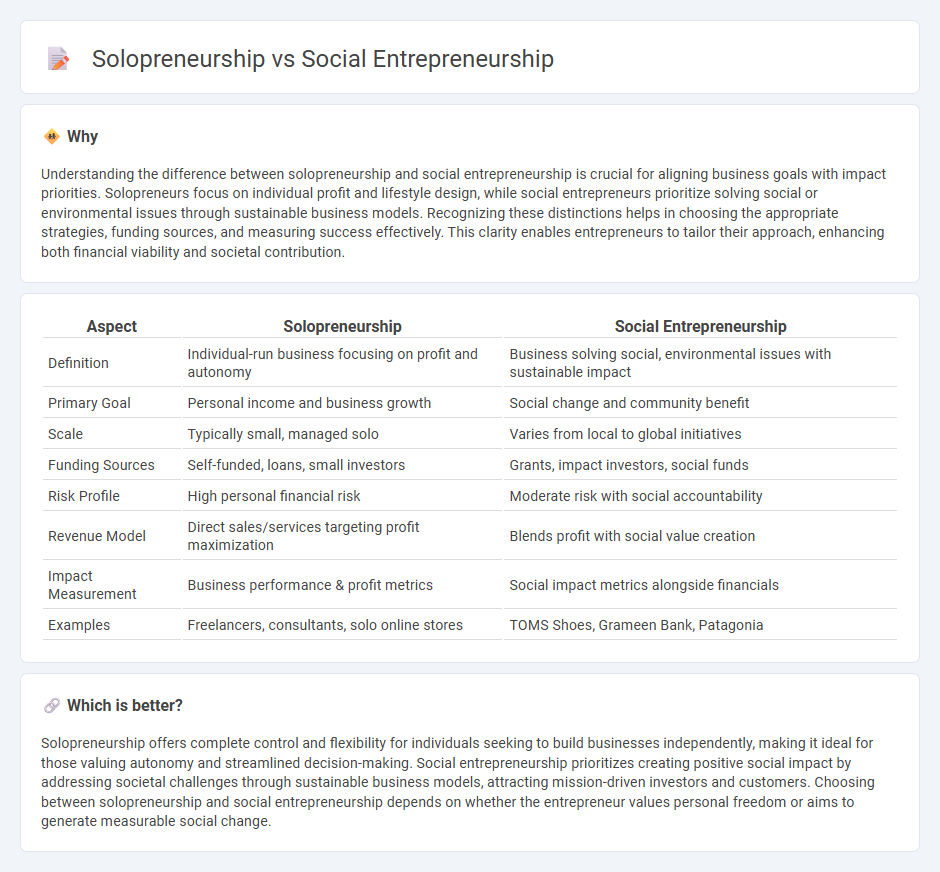
Solopreneurship focuses on individuals independently managing and growing their own business ventures, while social entrepreneurship prioritizes creating positive social impact alongside financial returns. Both models require innovation, resilience, and strategic planning but differ fundamentally in their primary goals--profit for solopreneurs versus societal change for social entrepreneurs. Explore the unique challenges and opportunities of each approach to understand which aligns best with your entrepreneurial vision.
Why it is important
Understanding the difference between solopreneurship and social entrepreneurship is crucial for aligning business goals with impact priorities. Solopreneurs focus on individual profit and lifestyle design, while social entrepreneurs prioritize solving social or environmental issues through sustainable business models. Recognizing these distinctions helps in choosing the appropriate strategies, funding sources, and measuring success effectively. This clarity enables entrepreneurs to tailor their approach, enhancing both financial viability and societal contribution.
Comparison Table
| Aspect | Solopreneurship | Social Entrepreneurship |
|---|---|---|
| Definition | Individual-run business focusing on profit and autonomy | Business solving social, environmental issues with sustainable impact |
| Primary Goal | Personal income and business growth | Social change and community benefit |
| Scale | Typically small, managed solo | Varies from local to global initiatives |
| Funding Sources | Self-funded, loans, small investors | Grants, impact investors, social funds |
| Risk Profile | High personal financial risk | Moderate risk with social accountability |
| Revenue Model | Direct sales/services targeting profit maximization | Blends profit with social value creation |
| Impact Measurement | Business performance & profit metrics | Social impact metrics alongside financials |
| Examples | Freelancers, consultants, solo online stores | TOMS Shoes, Grameen Bank, Patagonia |
Which is better?
Solopreneurship offers complete control and flexibility for individuals seeking to build businesses independently, making it ideal for those valuing autonomy and streamlined decision-making. Social entrepreneurship prioritizes creating positive social impact by addressing societal challenges through sustainable business models, attracting mission-driven investors and customers. Choosing between solopreneurship and social entrepreneurship depends on whether the entrepreneur values personal freedom or aims to generate measurable social change.
Connection
Solopreneurship and social entrepreneurship are connected through their shared focus on creating impactful, mission-driven ventures often initiated by a single individual. Both models emphasize innovation and resourcefulness to address social challenges while maintaining sustainable business practices. The solopreneur's agility complements social entrepreneurship's goal of generating positive societal change, blending personal autonomy with a wider social mission.
Key Terms
Social Impact
Social entrepreneurship prioritizes creating positive social change by addressing community needs through sustainable business models. Solopreneurship typically centers on individual entrepreneurship, focusing on personal freedom and profit rather than broader societal impact. Explore how these approaches differ in driving innovation and fostering meaningful social impact.
Individual Autonomy
Social entrepreneurship emphasizes creating impactful solutions for societal challenges by balancing profit and purpose, while solopreneurship centers on individual autonomy and personal business control without external stakeholders. Both models offer unique advantages: social entrepreneurs drive systemic change through collaborative efforts, whereas solopreneurs enjoy flexible decision-making and rapid adaptation. Explore deeper insights into how social entrepreneurship and solopreneurship shape modern business dynamics and individual empowerment.
Mission-Driven
Social entrepreneurship centers on addressing societal challenges through innovative, mission-driven business models that prioritize social impact and sustainability. Solopreneurship emphasizes individual autonomy and personal vision, often focusing on small-scale business operations without broader social objectives. Explore the distinctions and benefits of each approach to determine which aligns best with your goals.
Source and External Links
Social entrepreneurship - Wikipedia - Social entrepreneurship is an approach where individuals or groups develop and implement solutions to social problems, focusing on maximizing social impact rather than profit, as exemplified by figures like Muhammad Yunus and his microcredit innovations.
What Is Social Entrepreneurship? A Guide - Coursera - Social entrepreneurship is an innovative business venture aimed at creating lasting social change through business models that address systemic social or cultural problems in fields such as education, healthcare, and economic development.
Social Entrepreneurship: Creating Positive Change Through Business - Social entrepreneurship involves building business ventures that integrate profit with purpose, prioritizing sustainable social impact alongside financial viability while addressing issues like poverty, education, or sustainability.
 dowidth.com
dowidth.com